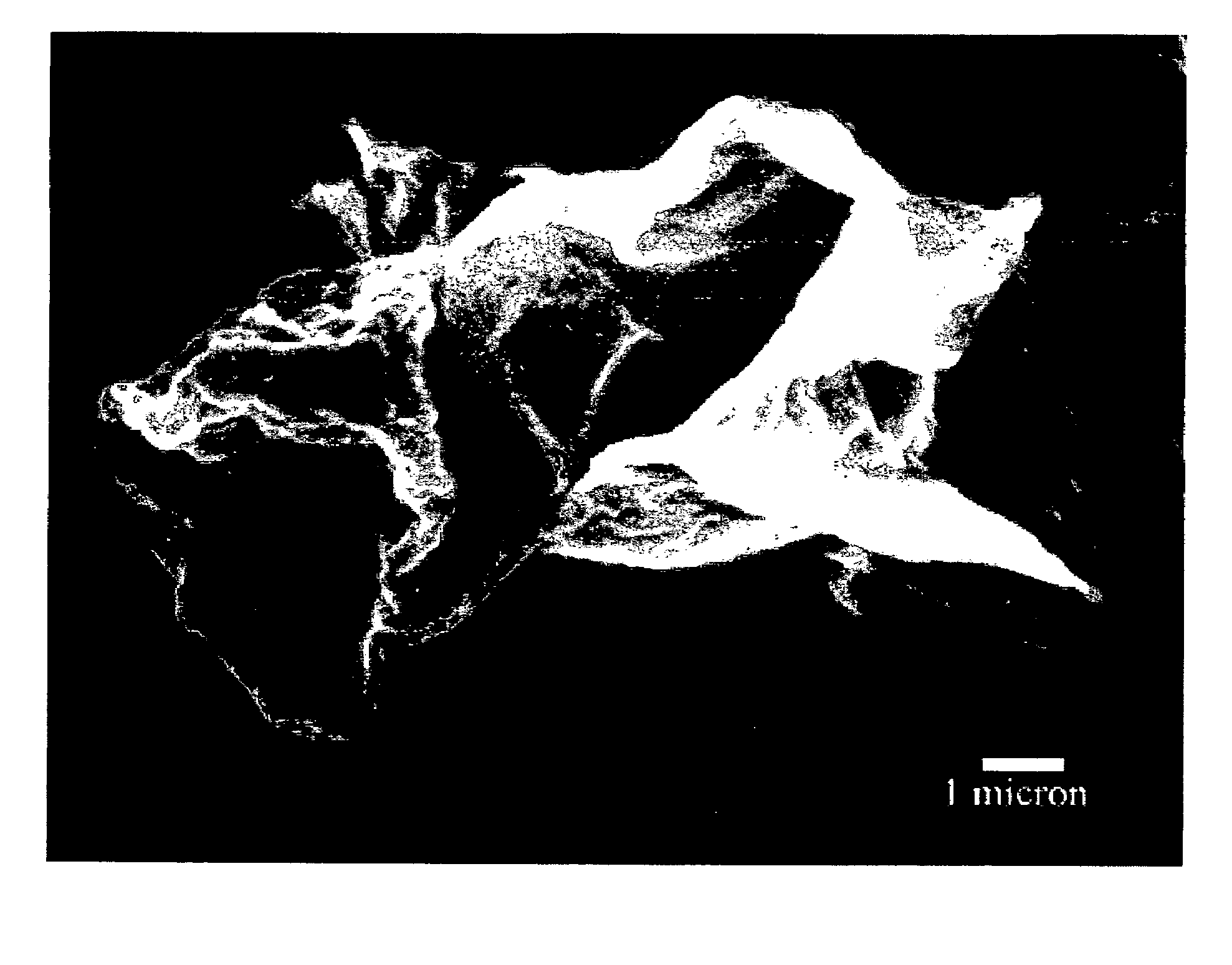Particulate compositions for pulmonary delivery
a technology of pulmonary artery and particle composition, which is applied in the direction of prosthesis, microcapsules, pharmaceutical product form change, etc., to achieve the effect of maximizing drug delivery, and minimizing the average wall thickness
- Summary
- Abstract
- Description
- Claims
- Application Information
AI Technical Summary
Benefits of technology
Problems solved by technology
Method used
Image
Examples
example 1
Production of Particles with Identical Compositions and Differing Morphologies (Spherical vs. Crumpled Paper)
[0064]Formulations consisting of 60:20:20 wt:wt dipalmitoylphosphatidylcholine (DPPC, Avanti Polar Lipids, Alabaster, Ala.):bovine serum albumin (BSA, Sigma Chemical Co., St. Louis, Mo.):lactose (Spectrum Chemical Co.,) were spray-dried in the following manner.
[0065]i. Production of particles with spherical morphologies. A Niro Mobile Minor Spray Dryer (Niro Inc., Columbus, Md.) equipped with a four vein (V4) rotary atomizer was utilized for powder production. Ethanol:water (70:30 vol:vol) solutions of 4.0 g / l concentrations were utilized for excipient solubilization. For a typical 1 liter batch size, 600 mg DPPC was added to 700 ml of ethanol, and 200 mg of BSA and 200 mg of lactose were added to 300 ml of water (pH adjusted to 8.1 via addition of 1.0 N NaOH after addition of the excipients). The spray drying conditions were as follows: 120° C. inlet temperature, 52,000 RPM ...
example 2
Powder Geometric and Aerodynamic Property Characterization
[0067]Powders produced via methods i and ii from Example 1 above were characterized for their geometric and aerodynamic properties. Powder dispersibility indicators (described below) were also obtained via geometric and aerodynamic analytical methods. Geometric size was obtained via laser diffraction (Sympatec RODOS system), with measurements taken at different dispersion pressures used as an indicator of powder dispersibility (experiments were conducted at dispersion pressures ranging from 0.25 to 4 bar. The RODOS system was also used in conjunction with an inhaler attachment system to measure particle size as a function of flowrate (30-90 l / min) through an inhaler, providing another indicator of powder dispersibility.
[0068]Aerodynamic size distributions of the particles were obtained via an Aerosizer system utilizing an Aerodisperser (API, Amherst, Mass.). The results of the geometric, aerodynamic and dispersibility charact...
example 3
SEM Imaging of Particle Morphology and Wall Thickness
[0073]SEM microscopy was utilized to both elucidate the differences in morphology between crumpled paper and spherical morphology powder samples and to confirm that the crumpled paper morphology powder samples possessed thinner walls than the spherical morphology samples. SEM images of samples of the unaltered powders are displayed in FIGS. 1 (formulation i) and 2 (formulation ii). For observation of wall thicknesses, the spherical powders were ground via the use of a 3″ diameter cyclone in order to fracture some of the particles to enable imaging of wall cross sections, whereas wall thicknesses were estimated for the crumpled paper morphology powders by observation of tightly folded regions (with the assumption that the wall thickness is approximately ½ the width of the tightly folded region). Estimates for the wall thicknesses were approximately 150 to 200 nanometers for the spherical particles and 80 to 120 nanometers for the c...
PUM
 Login to View More
Login to View More Abstract
Description
Claims
Application Information
 Login to View More
Login to View More - R&D
- Intellectual Property
- Life Sciences
- Materials
- Tech Scout
- Unparalleled Data Quality
- Higher Quality Content
- 60% Fewer Hallucinations
Browse by: Latest US Patents, China's latest patents, Technical Efficacy Thesaurus, Application Domain, Technology Topic, Popular Technical Reports.
© 2025 PatSnap. All rights reserved.Legal|Privacy policy|Modern Slavery Act Transparency Statement|Sitemap|About US| Contact US: help@patsnap.com



